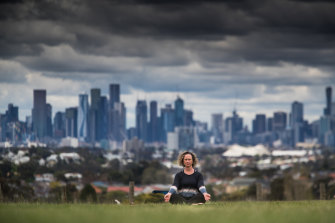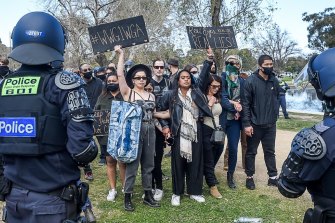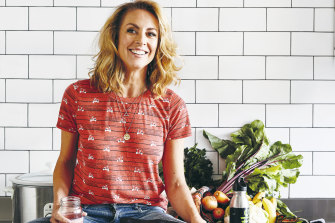‘Playing with fire’: The curious marriage of QAnon and wellness
At first, yoga teacher Emma Moulday couldn’t understand what was happening. Suddenly her peers – people she respected – were filling her social media feeds with anti-mask messages and calling COVID-19 a hoax. Then there were the hashtags to #SaveTheChildren and videos claiming actor Tom Hanks eats children.
“I thought, ‘what the hell is going on?’ It was like watching a really bad accident.”
That’s when Moulday found out about QAnon, a far-right conspiracy movement that has been proliferating around the world.
“I was really surprised that people who I thought were intelligent, mindful and discerning were so far down the garden path and really actively promoting it,” Moulday says.
Up until this year, QAnon largely existed on the internet’s fringes after an unidentified poster named “Q” began pushing coded theories in 2017. The core belief is that there is a cabal of Satan-worshipping paedophiles – made up of global political, business and Hollywood elites – who run the world, operate a child sex trafficking ring and are fighting President Donald Trump from bringing them down.
Today, on a backdrop of the worldwide pandemic, the spread of far-right thinking and crippling global uncertainty, its narratives have trickled into the mainstream on social media, including in Australia.
Lydia Khalil, research fellow at Deakin University and the Lowy Institute, says QAnon has grown louder by attaching itself to scepticism about the pandemic and fears over 5G and vaccination to feed the idea that there are more insidious motives at play.
“Clever movements will pick up on what’s happening currently to fit it into their conspiracies … It gives them a way to legitimise what they’re arguing,” Khalil says. “Over the past few months obviously everyone has been on the internet a whole lot more, so what we’ve started to see is this explosion and spread of QAnon content.”
Khalil says the conspiracy has now found a seemingly unlikely home in a space normally known for its gratitude mantras, downward dogs and green smoothies: the world of wellness – and its infiltration has begun to cause fierce division within the community.

Emma Moulday has noticed fellow yogis are falling down the conspiracy rabbit hole.Credit:Jason South
A division in the wellness space
Moulday – who has been a yoga teacher for 20 years and runs a studio, Yoga Flame, in Melbourne’s Moonee Ponds – says the spread of QAnon conspiracies in her industry is “disappointing”.
“The whole thing is really sad,” she says. “It feels all very wrong and feels counter to everything you’d stand for as a yoga teacher. I want to help people, and help them feel steady and calm. They’re the skills that will help people right now.”
Moulday estimates a quarter of people she follows from the yoga community are posting conspiracies, and she says she has been slammed for posting a light comment supporting masks.
“I haven’t seen anything like this before. I know there are alternative beliefs and viewpoints but not people … being so intimidating and aggressive in their viewpoints.”
Vanessa Hollo, a Melbourne yoga teacher who works in community health, has been equally disturbed.
“Beautiful, caring people were suddenly saying that COVID isn’t real,” Hollo says. “Yoga practice can help people deal with stress and isolation and anxiety and instead it’s being hijacked by misinformation and fear.”
Hollo was one of many to last week share a viral statement created by US wellness influencers to come out against QAnon.
“Our hearts are breaking from the rampant misinformation that is dividing our community,” the statement says.
Sarah Wilson, who became an Australian wellness figure off the back of her I Quit Sugar empire, says she has been bombarded by conspiracy thinking on social media, believing it may partially be triggered by Victoria’s second lockdown.
“It’s happening way more than I could have ever anticipated. It’s not just a handful of people,” Wilson says.
“I’ve looked at a lot of them thinking they’re going to be bots. But they’re not. They have large followings … These are people who genuinely believe in this information.”
Yoga practice can help people deal with stress and isolation and anxiety and instead it’s being hijacked by misinformation and fear.
Vanessa Hollo, yoga teacher
Wilson, whose new book This Wild And Precious Life explores our increasingly disconnected society, says she is alarmed by how wide-ranging QAnon followers are.
“This is across the spectrum… That’s what’s most alarming. These aren’t otherwise extreme people.”
The emergence of ‘pastel QAnon’
PhD researcher Marc-André Argentino, of Canada’s Concordia University, coined the term “pastel QAnon” to describe the phenomenon of lifestyle and wellness influencers adopting QAnon narratives with a soft and pleasing aesthetic, making audiences more susceptible.
He says it’s the polar opposite of “raw” QAnon, which began on controversial internet forums 4chan, 8chan and 8kun.
Loading
“To an extent [influencers] are making QAnon more palatable as your initial contact with it is not the cesspool that is 8kun with its racism, anti-semitism and pornography, rather it is coming from an influencer that many of their followers already trust for their lifestyle, medical and fitness advice,” Argentino says.
His research shows there was an initial wave of influencers falling into QAnon between March and May when it overlapped with anti-vaxxer or anti-mask narratives, propelled by the viral ‘Plandemic’ video peddling health misinformation.
Argentino says the second wave occurred when QAnon hijacked the hashtag #SaveTheChildren during child trafficking awareness month in July, drawing many influencers – because who doesn’t care about children?
‘Ripe’ for conspiracy thinking
Queensland University of Technology senior lecturer Dr Timothy Graham views wellness as “a real pivotal point” in QAnon’s evolution.
“There’s this normalisation of QAnon and a rebranding of it as an oppressed underdog movement that is really trying to get to the truth,” Graham says.
Khalil says it’s not entirely surprising that QAnon latched onto wellness.
“There is a history within the wellness community which has been anti-establishment, very sceptical of big pharma, so the QAnon conspiracies tend to feed into that.”
Hollo agrees, believing wellness was “ripe” for QAnon’s entry as many in the space are open to exploring alternative therapies and views. It’s why anti-vaxxer sentiment is so rife in this realm.
“Yoga and wellness people are very open-minded, so they can easily go down the rabbit hole,” Hollo says.
Adding to this, QAnon has also co-opted certain sayings or hashtags that will resonate with the community. #TheGreatAwakening is one of the group’s main hashtags and followers often talk about “waking up to the truth”, which are common phrases in new age spirituality practices such as yoga and meditation.
“It’s basically making a conspiracy that is so outlandish become something that is part of your own awakening and awareness journey,” Khalil says.
Derek Beres is an LA-based fitness instructor and co-host of the podcast Conspirituality, which launched in May to discuss how conspiracies seeped into the wellness world. Australians make up the podcast’s second largest listener base after the US.
“This whole QAnon phenomenon is speaking to very base fears that exist in a lot of people, especially people who consider themselves to be more consciously minded,” Beres says.
You now have people who won’t vaccinate themselves because they think they’re getting injected with microchips.
Dr Timothy Graham, Queensland University of Technology
He adds that social distancing has harmed the connection communities generally lean on in difficult times.
“All we have are these screens that we’re looking at all day. I think that added layer makes conspiracy theories proliferate in a way I know I’ve never experienced in my life,” Beres says.
“It’s a lot easier to spread fear and paranoia than it is to spread credible scientific research.”
Beres and his co-hosts curate a list of wellness industry figures who have shared QAnon-related content.
Celebrity paleo chef Pete Evans gets a mention after sharing posts that express QAnon ideas. Evans, a Trump supporter, has been vocal about being against compulsory vaccination and masks, suggesting the pandemic is a scam and railing against Daniel Andrews and the media. Of course, just because Evans has posted material that supports some QAnon rhetoric does not mean he supports all of the movement’s ideas, including its central beliefs, or that he identifies as part of the movement.
The tone of Evans’ social media intensified after he was axed by Channel Seven in May, and despite sharing some controversial ideas, Crowdtangle data shows interactions on his Facebook account skyrocketed by about 1000 per cent between April and June, and continue to be significantly higher than before. On Instagram his following has grown by almost 20 per cent since May.
When The Age and Sydney Morning Herald approached Evans to comment on his QAnon stance, he replied with “Who is Q?” and hours later, he shared a post referring to “the great awakening” and reposted screenshots of posts appearing to be from “Q”.
But this goes much wider than Evans. Some wellness influencers post overtly about child sex trafficking by elites, some use the motto “where we go one, we go all”, others focus on vaccine fears or hint they believe the pandemic is a cover-up. Some protect their brand by only sharing conspiracy content on their Instagram stories or highlights.

A woman at an anti-lockdown rally in Melbourne holds up a sign with the hashtag “#WWG1WGA”, which stands for “where we go one, we go all”.Credit:Justin McManus
‘Playing with fire’
Khalil says it’s unclear which wellness influencers fully understand and believe what the QAnon conspiracy alleges, or which ones are, perhaps inadvertently, grabbing certain elements that suit their interests. But she believes the latter can be just as dangerous.
“They’re playing with fire … A lot of these people who are ‘QAnon-lite’ are repeating some of the tropes and catchphrases, they think they’re bringing a sense of awareness to their followers but what they’re actually doing is dabbling in really dangerous disinformation,” Khalil says.
“They can almost act as a gateway into more extremist movements.”
Graham stresses there can be real-life consequences to the spread of QAnon, whether it’s undermining democracy, prompting people to commit violence or harming efforts of authorities to curb the virus.
It’s a real mistake to think these people are stupid or have got malicious intentions. Most of them genuinely are fearful.
Sarah Wilson, author and wellness figure
“You now have people who won’t vaccinate themselves because they think they’re getting injected with microchips,” Graham says.
Wilson believes it’s important to try to find some compassion and understanding of why many “good people” are tumbling into conspiracy thinking.
“They fill my feeds begging me to understand,” Wilson says. “It’s a real mistake to think these people are stupid or have got malicious intentions. Most of them genuinely are fearful.”

Author Sarah Wilson is alarmed by how wide-ranging QAnon followers are.
The Age and SMH approached several Australian influencers to understand their points of view. Most did not reply while one decided “the mainstream media is looking for a hit piece”.
Only one, a Sydney-based shamanic yoga therapist who asked not to be named, was open to sharing her perspective. She made Conspirituality podcast’s QAnon list after alleging child sex trafficking and satanic ritual abuse by elites, describing the pandemic as fake and asking people to “wake up” and “do your own research”.
While her beliefs echo QAnon thinking, she says they derive from her own spirituality and practices.
She discovered QAnon earlier this year and says she doesn’t agree with all its claims. For example, she says if children are being rescued from underground tunnels, she’d like to see evidence.
“Sometimes the execution is a bit sensationalised,” she says.
She explains her posts come from a place of genuine concern and desire to heal society, adding she does not sit politically on the left or right.
“I’m totally aware of people’s health and people’s sensitivities, but I always come from that sense of ‘just question; does that make sense to you?; how does that feel in your body?; trust your gut’,” she says.
“I sincerely hope we can keep showing up with more patience, greater tolerance and deeper compassion.”

A “Q” sign at an anti-mask protest in Montreal, Canada. Credit:AP
‘We need to get at the root causes’
The truth is, Khalil says, there have been failures that have eroded people’s faith in democracy, expertise and the establishment. Just look at the global financial crisis or even Victoria’s hotel quarantine scandal.
“If we try to understand and get at those root causes, it’s a better use of our time,” Khalil says.
She says it’s best not to argue logic with someone who believes in a conspiracy theory – both sides consider each other “brainwashed” – and instead engage with what’s driving their anxieties.
University of Wollongong wellness industry researcher Dr Nadia Zainuddin believes authorities need to be willing to be more transparent and admit to missteps, or else it feeds distrust, particularly during COVID-19 times.
“When there’s distrust in our leaders, people take it upon themselves to educate themselves so if you read a lot of people’s comments, they’re fond of saying ‘I’ve done my research’.”
Social media algorithms, which continue to surface misinformation, also have a lot to answer for too, Wilson points out.
“If we see more people liking these videos and watching more of these videos and it confirms our bias over and over again,” Wilson says.
Loading
Wilson calls for people who work in wellness to use their influence responsibly and make more efforts to critically distinguish between real and fake information.
Zainuddin thinks current events may trigger a bigger split in the wellness space, where one part does their due diligence and presents accurate information, while the other camp holds alternative beliefs because they are so core to their identity.
“There will always be this group that will continue to believe what they want to believe,” Zainuddin says. “They’re being very good marketers.”
For now, Beres believes it’s important for wellness influencers to take a public stand against QAnon and for people to find ways to support those who are sliding into it.
“There are going to be a lot of people who will come out of QAnon after being indoctrinated who are going to need help.”
Lydia Khalil’s advice on dealing with misinformation
QAnon accounts encourage people to “do your own research”. This turns it into a puzzle game and gives the illusion you are an independent thinker who is not beholden to what authorities or experts tell you. As a career researcher and analyst I can tell you that “doing your own research” does not just involve hunting for clues to confirm what you already believe. Real research involves the following:
- Checking sources: Who or what is the source and what is their level of access and accuracy and reliability? Has the source provided accurate information before? What is their mission, their history? Did they give supporting information? Where is this information coming from? Is it old information that is being rehashed?
- Seek experts: See what people who have studied and worked in the field are saying. Look at a fact-checking site. QAnon has promoted conspiracy theories about child trafficking – if you are concerned about child trafficking, seek out organisations and experts who have been working in this field. What do they say about the issue?
- Check in with yourself: Try to understand the difference between impressions, intuition, and reasoning. Try to understand your own patterns of thinking before accepting information as true.
- Not a game: Understand that QAnon is not a game or an “alternative” view of the world. The conspiracy theory has prompted people to commit acts of violence.


